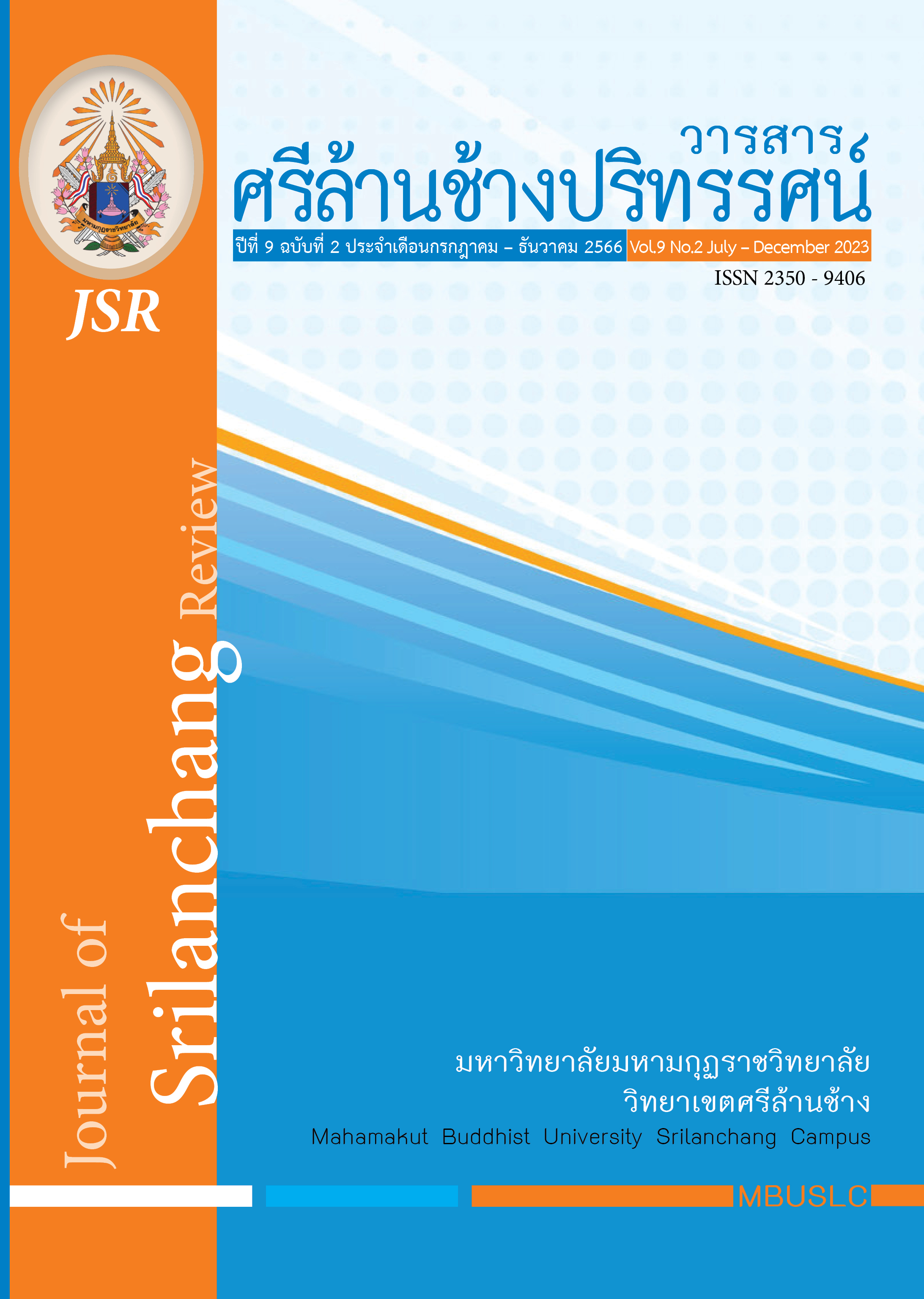แนวทางการพัฒนาสมรรถนะของผู้บริหารสถานศึกษาในยุคดิจิทัล สังกัดสำนักงานเขตพื้นที่การศึกษาประถมศึกษาเลย เขต 1
Main Article Content
บทคัดย่อ
การวิจัยครั้งนี้มีวัตถุประสงค์ 1. เพื่อศึกษาสภาพปัจจุบัน สภาพที่พึงประสงค์ และความต้องการจำเป็น สมรรถนะผู้บริหารสถานศึกษาในยุคดิจิทัล 2. เพื่อศึกษาแนวทางการพัฒนาสมรรถนะของผู้บริหารสถานศึกษาในยุคดิจิทัล และ 3. เพื่อประเมินแนวทางการพัฒนาสมรรถนะของผู้บริหารสถานศึกษาในยุคดิจิทัล กลุ่มตัวอย่าง จำนวน 302 คน ประกอบด้วยผู้บริหาร จำนวน 34 คน และครูผู้สอน จำนวน 268 คน โดยการกำหนดขนาดกลุ่มตัวอย่างตามตารางกำหนดขนาดกลุ่มตัวอย่าง Krejcie and Morgan และวิธีการสุ่มแบบแบ่งชั้นภูมิ เครื่องมือที่ใช้ในการเก็บรวบรวมข้อมูลเป็นแบบสอบถาม แบบสัมภาษณ์กึ่งโครงสร้าง แบบบันทึกการสนทนากลุ่ม และแบบประเมินอิงผู้เชี่ยวชาญ สถิติที่ใช้ในการวิเคราะห์ข้อมูลได้แก่ ร้อยละ ค่าเฉลี่ย ค่าเบี่ยงเบนมาตรฐาน ค่าดัชนีลำดับความสำคัญของความต้องการจำเป็น และการวิเคราะห์ข้อมูลเชิงคุณภาพ โดยวิธีการพรรณนาวิเคราะห์ ผลการวิจัยพบว่า 1. สภาพปัจจุบัน โดยภาพรวมอยู่ในระดับมาก (x̅ = 3.74, S.D. = 0.65) สภาพที่พึงประสงค์ โดยภาพรวมอยู่ในระดับมากที่สุด (x̅ = 4.81, S.D. = 0.36) และค่าดัชนีลำดับความสำคัญของความต้องการจำเป็น 3 อันดับแรก ได้แก่ คือ 1) ด้านการเป็นพลเมืองดิจิทัล (PNImodified = 0.32) 2) ด้านการสร้างวัฒนธรรมการเรียนรู้บนโลกยุคดิจิทัล (PNImodified = 0.31) และ 3) ด้านการปรับปรุงอย่างเป็นระบบ (PNImodified = 0.28) 2. แนวทางการพัฒนาสมรรถนะของผู้บริหารสถานศึกษาในยุคดิจิทัล มีองค์ประกอบ 5 ด้าน ได้แก่ 1) ด้านการเป็นพลเมืองดิจิทัล ประกอบด้วย 3 วิธีดำเนินการ 3 โครงการ 3 กิจกรรม 12 วิธีปฏิบัติ 2) การสร้างวัฒนธรรมการเรียนรู้บนโลกยุคดิจิทัล ประกอบด้วย 3 วิธีดำเนินการ 3 โครงการ 3 กิจกรรม 12 วิธีปฏิบัติ 3) ด้านการปรับปรุงอย่างเป็นระบบ ประกอบด้วย 3 วิธีดำเนินการ 3 โครงการ 3 กิจกรรม 12 วิธีปฏิบัติ 4) ด้านการสร้างความเป็นเลิศในการปฏิบัติอย่างมืออาชีพ ประกอบด้วย 3 วิธีดำเนินการ 3 โครงการ 3 กิจกรรม 12 วิธีปฏิบัติ และ 5) ด้านการเป็นผู้นำเชิงวิสัยทัศน์ ประกอบด้วย 3 วิธีดำเนินการ 3 โครงการ 3 กิจกรรม 12 3. ผลการประเมินแนวทางการพัฒนาสมรรถนะของผู้บริหารสถานศึกษาในยุคดิจิทัล โดยภาพรวมอยู่ในระดับมากที่สุด (x̅= 4.57, S.D. = 0.47) เรียงลำดับจากค่าเฉลี่ยมากไปหาน้อย คือ ด้านความเหมาะสม (x̅= 4.64, S.D. = 0.42) ด้านความเป็นประโยชน์ (x̅= 4.60, S.D.= 0.40) และ ด้านความเป็นไปได้ (x̅= 4.48, S.D. = 0.59)
Article Details

อนุญาตภายใต้เงื่อนไข Creative Commons Attribution-NonCommercial-NoDerivatives 4.0 International License.
บทความที่ได้รับการพิจารณาจากคณะกรรมการผู้ทรงคุณวุฒิและเผยแผ่ในวารสารฉบับนี้ เป็นทัศนคติและข้อคิดเห็นส่วนบุคคลของผู้เขียนแต่ละท่าน ไม่ถือว่าเป็นทัศนะคติและความรับผิดชอบ
ของบรรณาธิการ
บทความ ข้อมูล เนื้อหา รูปภาพ ฯลฯ ที่ได้รับการตีพิมพ์ในวารสารศรีล้านช้างปริทรรศน์ ถือเป็นลิขสิทธิ์ของวารสารศรีล้านช้างปริทรรศน์ หากบุคคลหรือหน่วยงานใดต้องการนำทั้งหมดหรือส่วนหนึ่งส่วนใดไปเผยแพร่ต่อหรือเพื่อกระทำการใด ๆ จะต้องได้รับอนุญาตเป็นลายลักอักษรจากวารสารศรีล้านช้างปริทรรศน์ ก่อนเท่านั้น
เอกสารอ้างอิง
จตุรพล แสนศิลา และพชรวิทย์ จันทร์ศิริสิร. (2564). แนวทางการพัฒนาสมรรถนะด้านการมุ่งผลสัมฤทธิ์ของผู้บริหารสถานศึกษาในยุคดิจิทัล สังกัดสำนักงานเขตพื้นที่การศึกษาประถมศึกษามหาสารคาม เขต 3. วารสารบัณฑิตศึกษามหาจุฬาขอนแก่น. 8 (2): น. 130 - 138.
เจษฎา ชวนะไพศาล. (2563). แนวทางการพัฒนาภาวะผู้นำเชิงเทคโนโลยีของผู้บริหารสถานศึกษากลุ่มสหวิทยาเขตทวารวดี สังกัดสำนักงานเขตพื้นที่การศึกษามัธยมศึกษาสุพรรณบุรี. นครปฐม: บัณฑิตวิทยาลัย มหาวิทยาลัยศิลปากร
ชัญญาภัค ใยดี. (2560). การศึกษาแนวทางการพัฒนาภาวะผู้นำเชิงเทคโนโลยีของผู้บริหารสถานศึกษา สังกัดองค์การบริหารส่วนจังหวัดนครราชสีมา. วารสารดุษฎีบัณฑิตทางสังคมศาสตร์, 8(1), 150-163.
นิติ ญานะ. (2566). สมรรถนะของผู้บริหารสถานศึกษายุคดิจิทัล สังกัดสำนักบริหารงานการศึกษาพิเศษ จังหวัดเชียงใหม่. วารสารปัญญา, 30(2)
ภัทรา ธรรมวิทยา และคณะ (2557). การศึกษาภาวะผู้นำเชิงเทคโนโลยีของ ผู้บริหารโรงเรียน
เอกชน ระดับประถมศึกษาในเขตธนบุรี. วารสารอิเล็กทรอนิกส์ทางการศึกษา, 10(1), 1–13.
ภัทราพร ธัญกิจเจริญสิน. (2558). ภาวะผู้นำทางด้านเทคโนโลยีสารสนเทศของผู้บริหารสถานศึกษา สังกัดสำนักงานเขตพื้นที่การศึกษาประถมศึกษานครราชสีมา เขต 7 ตามความคิดเห็นของผู้บริหารและครู. สิกขาวารสารศึกษาศาสตร์, 3(1), 5
อดิศักดิ์ ดงสิงห์. (2560). แนวทางการพัฒนาภาวะผู้นำเชิงเทคโนโลยีของผู้บริหารสถานศึกษา สังกัดสำนักงานเขตพื้นที่การศึกษามัธยมศึกษา เขต 1. วิทยานิพนธ์ ศษ.ม. (การบริหารการศึกษา). นนทบุรี: บัณฑิตมหาวิทยาลัย มหาวิทยาลัยสุโขทัยธรรมาธิราช.


